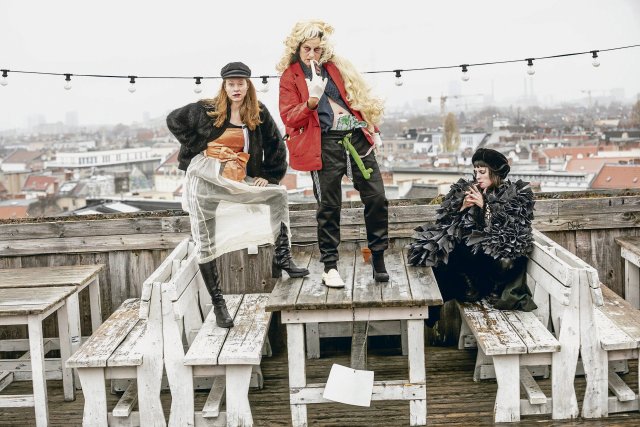Devilish stuff? In Berlin-Neukölln people try their hand at Viennese operetta.
Photo: Verena Eidel
Anyone who knows the Berlin music theater collective Glanz und Krawall knows what to expect: a good-humoured demolition of classics. The favorite victim is Richard Wagner. But who likes to commit? And so the theater makers are also looking for other areas of attack in the canon of well-known and lesser-known musical theater works.
Now, for the first time, Glanz und Krawall has an operetta (Viennese provenance) on the schedule, which will premiere this Friday at the home port in Berlin-Neukölln. Franz von Suppè is the composer of choice, “The Devil on Earth” is the chosen piece, the title of which can be reinterpreted as “City of Devils” with a clear conscience, because the creation from the century before last is handled in the freest possible way. There’s still a bit of operetta in there, expanded to include wild punk and rather ironic, shallow pop tones.
And what about the plot in this little opera, which is hardly ever seen today? The chief devil Satan doesn’t have it easy, his lower devils are rehearsing rebellion and want democracy in the kingdom of hell. To support the traditional order, he sets out to find his ministers Beelzebub, Lucifer and Samuel, who have made themselves comfortable on earth incognito. So there’s work waiting for the devil in chief before everything resolves itself in an operetta-like, amicable way at the end.
In the glamor and riot of “City of the Devils” all that remains of Suppè’s demonic sequence of scenes is a skeleton, which is filled out with motifs from Mikhail Bulgakov’s masterful novel “Master and Margarita” – which has been staged numerous times and filmed just as often. Now the 19th century Satanas has to contend with the Soviet century Margarita.
The unifying element is obvious: the devilish. Furthermore, it remains a bold construction. The restorative devil power, which is resistant to the bourgeois-liberal rebellion from below, written by Suppès has little to do with Bulgakov’s opus about bureaucratism and arbitrariness as pillars of Stalinist rule. Glamor and ruckus try to bring both of them into the present and connect them with struggles in today’s capital.
The two actions do not merge into one another, but rather collide again and again. However, the music theater evening is at its strongest when a major operetta takes place here, when the Nachtigall neighborhood choir from Neukölln effectively enters the scene and when Suppè is played. Because 21st century punk can hardly compete with this absurdly comic art form between a light muse and anarchic spirit. Even if glitz and ruckus are shooting in all directions: against gentrification and for redistribution, against the patriarchy and the rock grandpas, against Christian Democratic city festival coziness, for the devils down there and against the devils on earth.
At some point during this two-hour evening everyone got a little annoyed. However, we don’t really know where this will lead. But that may also be irrelevant when it comes to dealing with the devil.
Premiere: March 22nd
Further performances: March 23rd, April 12th and 13th
www.heimathafen-neukoelln.de
Become a member of the nd.Genossenschaft!

Since January 1, 2022, the »nd« will be published as an independent left-wing newspaper owned by the staff and readers. Be there and support media diversity and visible left-wing positions as a cooperative member. Fill out the membership form now.
More information on www.dasnd.de/genossenschaft
link sbobet demo slot akun demo slot judi bola online
